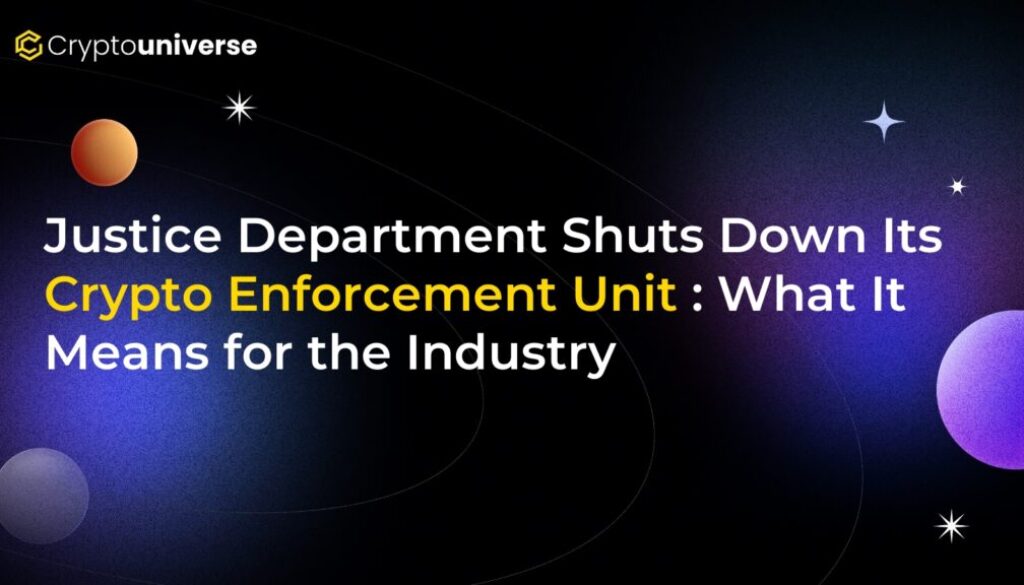Justice Department Shuts Down Its Crypto Enforcement Unit: What It Means for the Industry

Major Shift in US Crypto Policy: DOJ Disbands NCET
In a significant move reflecting the Trump administration’s evolving stance on digital assets, the U.S. Department of Justice (DOJ) has abruptly shut down its specialized unit dedicated to investigating cryptocurrency fraud. According to a memo from Deputy Attorney General Todd Blanche, the National Cryptocurrency Enforcement Team (NCET) was closed “effective immediately” on Monday night.
This decision comes amidst a broader push by the administration to embrace the burgeoning crypto market and signals a potential end to what some critics called an era of “regulation by prosecution.”
Why Was the Crypto Unit Shut Down?
The directive to disband the NCET aligns with President Trump’s Executive Order 14178, which emphasizes the need for “clarity and certainty regarding enforcement policy” to foster innovation in the digital asset space. Deputy Attorney General Blanche, previously one of Trump’s criminal defense lawyers, stated in his memo that the move aims to end the “regulatory weaponization against digital assets.”
“The Department of Justice is not a digital assets regulator,” Blanche wrote, criticizing the previous administration’s approach as a “reckless strategy of regulation by prosecution, which was ill conceived and poorly executed.”
The administration intends to redirect resources previously used for broad crypto enforcement towards combating transnational criminal organizations, terrorist groups using crypto, drug traffickers, and immigration-related crimes.
What Was the NCET?
Established in February 2022, the National Cryptocurrency Enforcement Team was created to tackle the challenges posed by the criminal misuse of cryptocurrencies. The team comprised experienced DOJ attorneys specializing in crypto, cybercrime, money laundering, and forfeiture. Its primary goals included:
- Prosecuting criminal uses of digital assets, focusing on non-compliant exchanges and facilitators.
- Setting strategic priorities for digital asset technologies.
- Coordinating with domestic and international law enforcement, regulators, and the private sector.
New Focus: Targeting Specific Crypto Crimes
While the dedicated NCET unit is gone, the DOJ isn’t abandoning crypto-related crime entirely. Blanche’s memo clarifies the new focus:
- Protecting Investors: Prosecuting individuals who defraud digital asset investors.
- Combating Illicit Use: Targeting those using crypto for terrorism financing, narcotics and human trafficking, organized crime, hacking, and cartel activities.
However, the DOJ will cease actions perceived as imposing regulatory frameworks, leaving that to designated regulatory agencies. Consistent with this, the Market Integrity and Major Frauds (MIMFU) Unit will also stop its crypto enforcement to focus on other priorities like immigration fraud. The Computer Crime and Intellectual Property Section (CCIPS) will continue to provide guidance and industry liaison.
Trump’s Pro-Crypto Stance Takes Hold
This move is the latest in a series of pro-cryptocurrency actions under President Trump. Since taking office, he has:
- Issued executive orders aimed at making the U.S. a global crypto hub.
- Courted crypto industry leaders, promising reduced regulation, which garnered significant campaign support.
- Co-founded a financial firm (World Liberty Financial) with crypto interests.
- Launched his own crypto token ($TRUMP), which saw significant value surges, though raising ethical concerns.
- Established a Digital Asset Markets working group.
- Ordered the creation of a federal Strategic Bitcoin Reserve.
These actions suggest a future where cryptocurrencies like Bitcoin could become more integrated into the mainstream financial system.
Reactions: Celebration and Concern
The crypto community largely celebrated the news, with many seeing it as the end of overly aggressive enforcement. Tweets echoed sentiments like “THE WAR ON CRYPTO IS OVER” and praised the end of “pointless witch-hunts against crypto founders.”
BREAKING: US DEPARTMENT OF JUSTICE DISBANDS CRYPTO ENFORCEMENT UNIT “EFFECTIVE IMMEDIATELY” TO COMPLY WITH TRUMP ORDER
THE WAR ON #BITCOIN IS OVER 🔥 pic.twitter.com/4lAS937NmS
— Bitcoin Magazine (@BitcoinMagazine) April 8, 2025
However, experts expressed concern. Nate Sibley of the Hudson Institute noted on X (formerly Twitter) that “Dangerous US adversaries rely on cryptocurrencies to launder money and evade sanctions,” questioning how disbanding the unit aligns with cracking down on cartel finances or Iran sanctions.
What’s Next for Crypto Regulation?
The shutdown of the NCET marks a clear shift away from using the DOJ as a primary crypto regulator. While proponents hope this fosters innovation and reduces legal uncertainty for crypto businesses, critics worry it might weaken efforts to combat illicit financial activities facilitated by digital assets.
The focus now shifts to how designated regulatory agencies will handle the crypto space under the Trump administration’s guidance and whether the DOJ’s refocused efforts will be sufficient to tackle sophisticated criminal operations using digital currencies.


